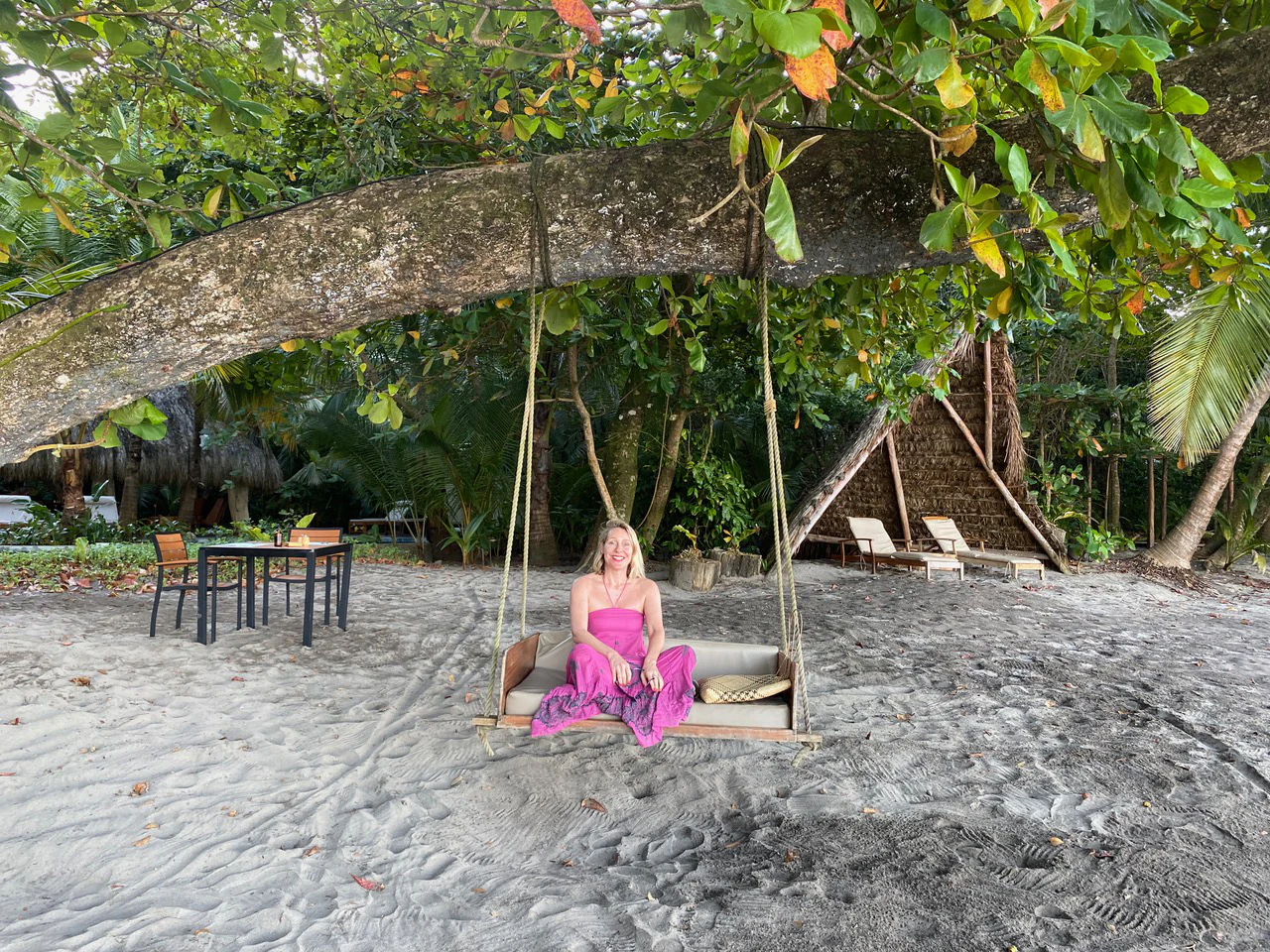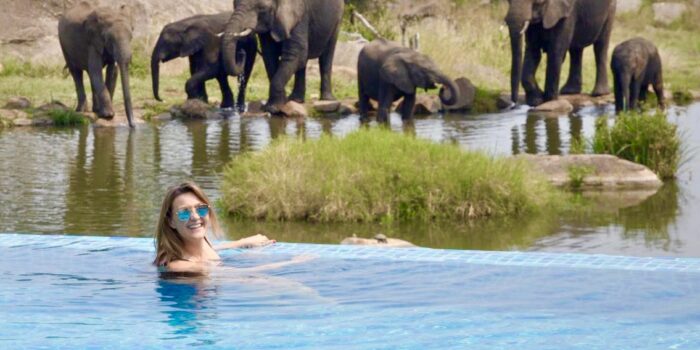Interview with Juliet Kinsman, founder of BOUTECO and founding editor of Mr & Mrs Smith, Sustainability Editor of Conde Nast Traveller and author of ‘The Green Edit: Travel, Easy Tips for the Eco-Friendly Traveller’ (Ebury Publishing), and author of Louis Vuitton City Guides.
2022 is all about sustainable travel. So to kick off Spring 2022 we are delighted to be able to chat to the UK’s leading sustainable travel expert Juliet Kinsman. Juliet says ‘through my consultancy, BOUTECO (a portmanteau of boutique and eco), I work with award-winning brands to help them stand for something and stand out for it, amplifying messages that matter and sharpening their spirit of sustainability. I love celebrating forward-thinking hotels, travel visionaries and luxury brands that are having a positive impact’.
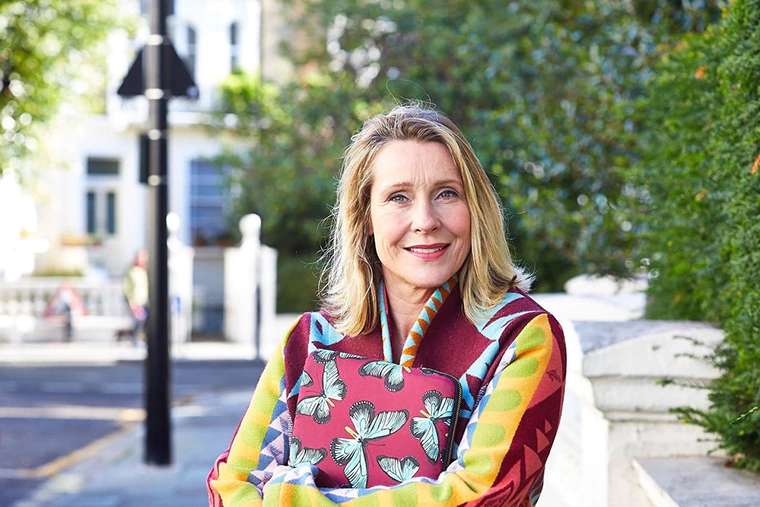
Juliet hello!
Can you define sustainable travel? Lots of us see it as about climate awareness and being more ethical, but obviously it goes so much deeper in terms of social and economic good?
For me, sustainable tourism is when us travellers take trips that actively do good rather than just being about indulgence and a high carbon footprint — which can be hard to justify when it involves gas-guzzling long-haul flights, right? Eco or green travel, is about weighing up the trade-offs and balancing what’s going to genuinely be helpful for people and planet. It’s about considering the bigger picture, and trying to ensure we support independently-owned businesses every step of the way that leave money in communities that most need revenue or support conservation.
We are seeing the terms ‘eco-friendly’ and ‘sustainability’ everywhere now from loo paper to bank accounts to luxury travel — the trouble with an in-vogue vernacular being casually thrown around, is it loses gravitas. In the absence of official universally mandated definitions, it’s about us having conversations where we hold businesses to account when they do brandish these terms. I overheard the COO of a luxury hotel brand recently brag about their “intensive sustainability programme”. What does this actually mean? Companies should be made to qualify such bold statements. Travel businesses need to be specific and transparent about their so-called positive-impact virtues. Tour operators and accommodation providers need to demonstrate how their business exists for the benefit of nature or communities and not just their shareholders.
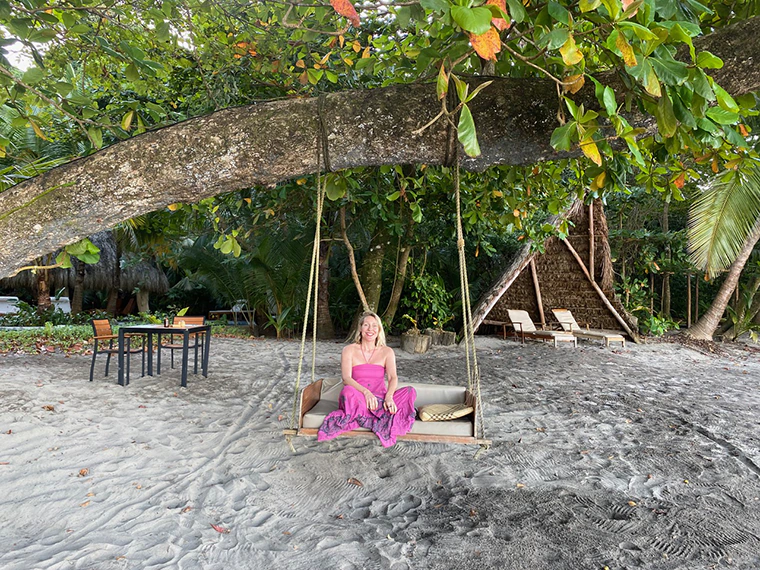
Holidays that help leave currency in the hands of the less privileged is key to tackling many of the cause of the climate emergency. Employment from hospitality leads to improved education, this in turn tackles population growth (better-educated women marry later and have less children), it can stem illegal logging and wildlife destruction (as those responsible are converted from poacher to protector), and it influences improved agricultural practices. Basically, tourism is linked to every topic on the climate emergency agenda. So, just as you reach to pick up the phone to ask room service to replenish your ice bucket, don’t let me talking about humankind’s impending doom when it comes to the climate emergency be a buzzkill. Let’s just frame what we need to be thinking about in a jollier musical theatre way: picture the soprano nuns in Sound of Music lamenting over flighty Maria, trilling instead: “how do you solve a problem like the Climate Emergency? How do you catch a cloud and pin its emissions down…” All we need is to keep talking more about what sustainability actually means in every context. Like we are here. And let’s constantly aim for a better kind of tourism where we still have fun, but in a way that benefits the ‘we’ not just the ‘me’.
How has the pandemic been for you? It has been a rollercoaster for most…
Having just been on the most incredible trip to Costa Rica and Panama, I can confirm I’ll never take travel for granted again. I am so grateful to have my health, and work. What has been significant from the pandemic is that it feels as though the world has at least woken up to the importance of sustainability and tackling the climate collapse — especially now so many of us are increasingly affected by extreme weather! On the bright side I was appointed Conde Nast Traveller’s first Sustainability Editor in 2020 and at the start of this year, Google searches for ecotourism were up 500% — that’s got to be a good thing.
On a personal level, it’s been the most challenging stretch of my life for lots of reasons — as for many people. Mostly the gnawing anxiety of feeling lonely and powerless and unsure of the path ahead. I try search for silver linings usually, and I’m certain there are positives to being made to slow down and stop travelling the world. Thing is, my family is scattered across the globe and it was very lonely not being able to see them and I think I shrunk too much into my shell in my basement flat, where I pondered the climate emergency to depression-inducing levels at times! When the floods of 12 July 2021 hit London I lost my home and a lot of my furniture and that really put things in perspective. Happy to say I’ve finally since seen family in New York which was a tonic. Travelling isn’t just about holidays — it’s about spending time with your people. And as we know, a sense of belonging ranks high on Maslow’s hierarchy of needs after food and safety!
Although we’ve had a ‘pandemic pause’ on travel, we imagine people are keener than ever to go abroad, and have on their radar their impact, given that the climate crisis is a ticking timebomb. Which countries are your top sustainable travel recommendations for visiting for this year?
Costa Rica felt worth the air miles, for sure! When you visit somewhere that invests so much time and energy in protecting nature, and where the average salary is $800 a month it feels a worthwhile choice! The people there all have a really positive warm energy — which is interesting when you then discover that as far back as 1949, they abolished their armed forces. President José Figueres Ferrer, the leader of their revolution, declared it a gift of ”love of civility, democracy and institutional stability’. The government of this nation of 2 million instead invested funds instead in education and social care — and I’m pretty sure that’s contributed to the enduring good vibes and sense of community. Add to that a quarter of the country is protected as national parks, wildlife reserves, marine sanctuaries and conservation areas.
I actually went because I wanted to experience some of the hotels in Cayuga Collection as I know their properties are among the most sustainably managed in the world. I love that Hans Pfister, founder, always says nothing is off-limit. I learned so much from my time with his team. For two decades, Cayuga has been running luxury resorts which invite guests to check out their Back of the House activity and their Sustainability Tours show you why their kitchen, laundry and maintenance facilities are way greener than your average operations.
Senda Monteverde Mountain Lodge in the Cloud Forest only opened in 2018 and still feels like our little secret. Meeting Nicaraguan chef Pedro who’s the superstar ensuring El Sapo Restaurant is not only the best rated for miles, but demonstrating how you don’t need a big-name chef to wow with the freshest local ingredients, prepared thanks to training in ancestral indigenous methods of cooking… It all left an especially good taste knowing how sensible Senda is with their food waste — they weigh and measure everything; I’ve seen this first-hand! And I even met some of their suppliers, such as coffee growers and cheesemakers, helping ensure more than 95% of what’s on the menu comes from within a 200-mile radius.
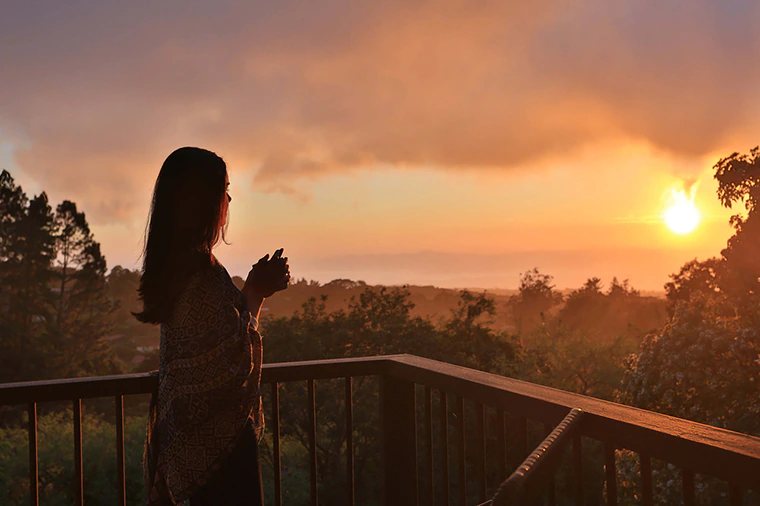
Arenas Del Mar in Manuel Antonio is the most adorable family-friendly boutique beach resort where there is so much wildlife right on your doorstep — I saw three sleeping slots on my visit. But what really made my heart smile was seeing how happy the housekeeping team is — and getting a privileged peek at their greener way of laundering right down to their just-do dosification of eco-friendly detergents.
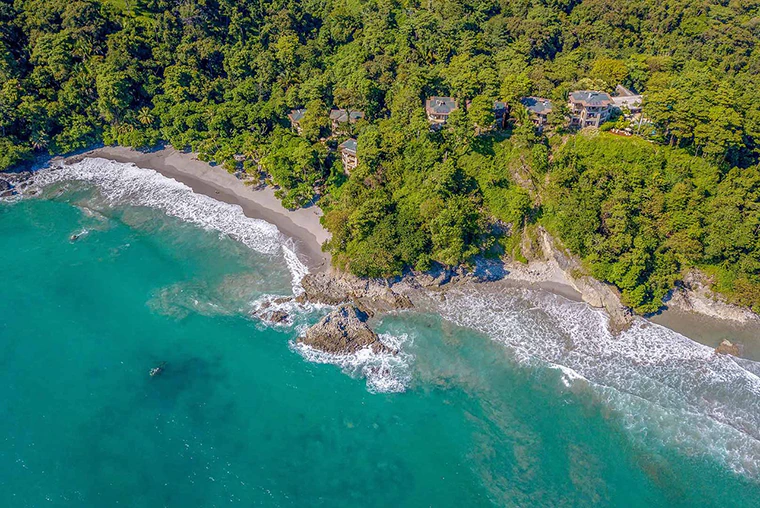
Kura in Uvita is well known as one of the most sexy and sustainable luxury stays on the Pacific Coast‚ and it’s only eight suites here where the rainforest meets the sea. But for me, the most alluring aspect was how canny they are behind the scenes when it comes to composting. Yes, yes private plunge pools, but my goodness that Japanese Takakura composting system using leftovers to make our own organic fertiliser was impressive.
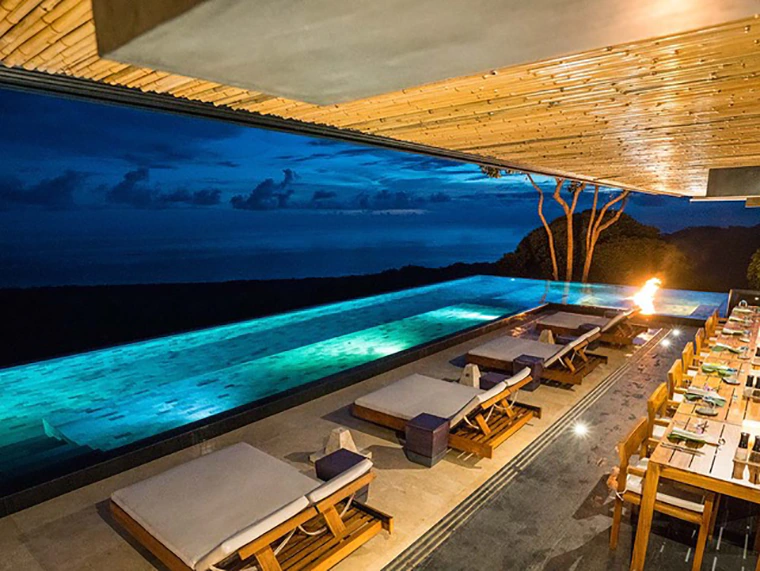
Aguas Claras in Puerto Viejo, up on the Caribbean side gets a lot less attention than the usual American-favoured circuit stays in Guanacaste or Tulum-rivalling Santa Teresa. I loved how wild and undeveloped those beaches are. So it’s all the more precious when you know how much they invest in insuring they’re having a light touch on nature while the creative mother-daughter hosts go heavy on art and style.
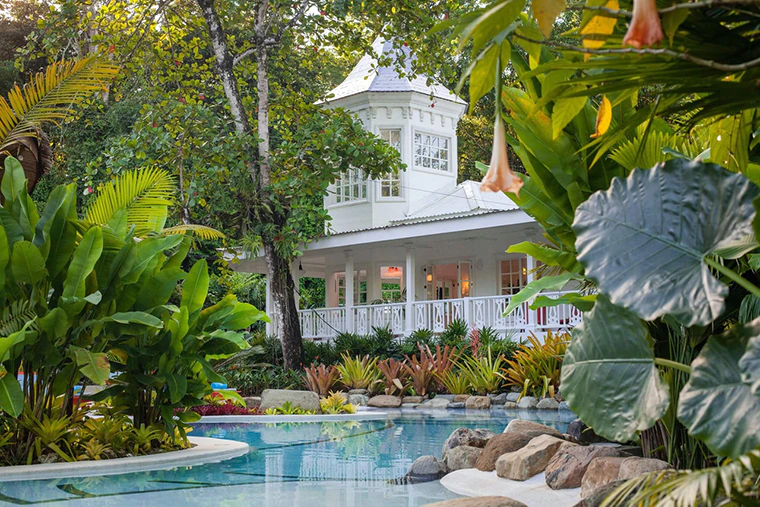
‘Sustainability can be compared to teenage sex, right? Everyone’s talking about it. Few are actually doing it. And many that are doing it, aren’t doing it very well’. We love this quote from your book ‘The Green Edit: Travel’: What is fundamental to getting it right?
Thinking about who you give your money to, at every moment, and considering exactly what it is a business is doing to make the world a better place is key. Everyone’s wising up to ‘ecotourism’ representing social and economic good as well as environmental – hooray. The truth is though, I still find sustainability, well, a rather joyless word. Don’t you? This polysyllabic buzzword evokes plodding along, in comfortable yet unattractive shoes, things dragging on as they are, possibly along a route with a relentless incline upwards. Whereas the term luxury — ooh, just saying that is fun: luuggshury — as purred so well by those who’ve grown up immersed in it. Now that’s a word that trips off the tongue like delicate, dainty slippers reserved for special occasions, delightfully impractical and en route to something fabulously life-sweetening. Sustainability and luxury as words, are both so worn at the heel, almost to the point of being unwearable, yet great news – when combined, they are the perfect complement. Throw into the mix ‘responsible’, ‘regenerative’, ‘conscious’, ‘mindful’ and it’s like a cocktail party of socialites who you’ve seen and heard so often yet ceased to actually remember what it is they actually do. But you know you love them.

Holidays that help leave currency in the hands of the less privileged is key to tackling many of the cause of the climate emergency.

